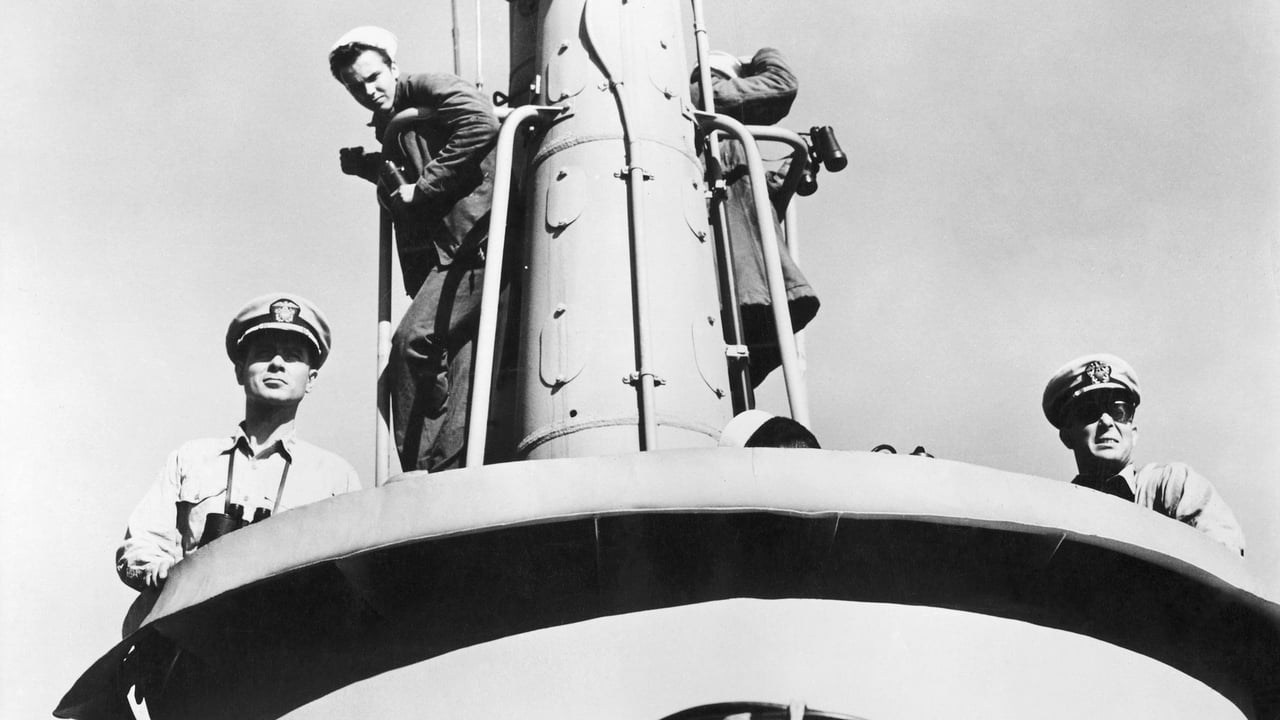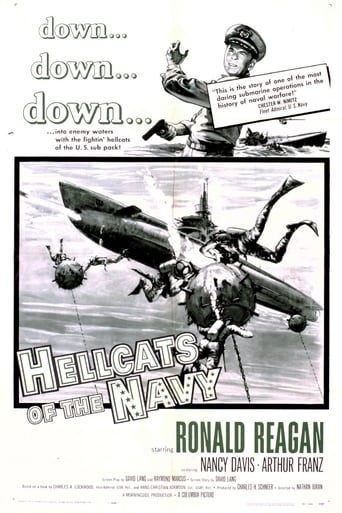

I have watched this film more than once and like it better each time. If Ronald and Nancy Reagan in leading roles are not enough, it has Admiral Chester A. Nimitz, Commander in Chief, Pacific, during World War II, in a speaking role. And it is not just a bunch of flag waving (except in the best sense, of course). It addresses the burdens of command and making difficult decisions unemotionally on the basis of good judgment. Reagan is a submarine commander who has to dive fast, leaving a crew member overboard, because a Japanese destroyer is bearing down on them. His exec and some of the crew despise him for what looks like cowardice. The captain tells his exec exactly how and why he made the decision, but the exec is unconvinced. The exec demands and gets a Navy board hearing, which confirms the decision. It is a remarkable film if only for seeing a president and first lady in romantic film roles discussing marriage. He declines marrying, telling her, "I want a wife and children not a widow and orphans." Stern stuff there. Then when the "hellcats" (submarines dispatched to cut off shipping across the Sea of Japan) are ready to go Admiral Nimitz gives their captains a preparatory speech on camera. I found watching the film in this and other ways exceptional and not your standard Hollywood war rattler. The story wraps up with the exec having to make the same decision Reagan made in the earlier scene. Movies used to have braver messages than today, but that figures.
... View MoreI watched this mainly as a curiosity because of the pairing of Ronald Reagan and Nancy Davis. As I understand it, this was the only movie they ever made together. I really don't know much about either of them as actors. To me, they're the former president and first lady of the United States, and I don't really recall having seen either of them in any other movie. This was one of Reagan's last movies before he went into television and then politics. I've heard a lot of jokes around Reagan's acting career - but based on this I'd say those have more to do with people not liking his presidency than his acting. I can understand why his career was in "B" movies. He wasn't great in this, but he wasn't bad either.The movie was a bit formulaic. Reagan played Captain Abbott - a submarine commander in the Pacific in World War II. As the movie opens he has to make a decision that results in the death of a crewman. Coincidentally, that crewman was involved romantically with a nurse named Helen (Davis) - who had previously been involved with Abbott. This set up tension between Abbott and his executive officer, Landon (Arthur Franz) who believed Abbott had been influenced by jealousy.The movie wasn't bad. There were a few suspenseful scenes as Abbott's sub either attacked or was being attacked by Japanese vessels. I thought it strange that, given the tension and distrust between them, the US Navy would keep Abbott and Landon together, and the whole thing came down to a predictably happy ending for all.I'd say this movie was OK, as was Reagan's performance. I may have watched it out of curiosity because of Reagan and Davis, but having watched it what really strikes me as interesting was the opening prologue by Admiral Chester Nimitz, who clearly thought that the story of Pacific submariners needed to be told. (6/10)
... View MoreWhere do I start. Hellcats was the name for naval aircraft the F6F Grumman not submarines.They were Gatos. The submarine goes from a normal sized tube for a Gato class sub to a tube large enough to hold a 10' ceiling. Ronald Reagan's acting was as stiff as it gets. The dialog between him and Nancy Davis was as contrived as it gets. The dialog in general sounded like it was a Mark 7 production. There was a scene where a Japanese sub was firing its deck gun while the muzzle of the deck gun was still moving. Miraculous gunners they were because that shot and every other hit target. There were enrichment shots in the film that looked more like U boats than Gatos. The important thing is this movie ruined Ronald Reagan's film career. From this movie came TV and a B movie or two(made for big and little screens) and finally life in the desert as narrator of "Death Valley Days".
... View MoreMost of the comments about this very ordinary war film concerns the fact that it is the only film that co-starred Ronald and Nancy Reagan. Both of them did better work in Hollywood.The real story is that Fleet Admiral Chester W. Nimitz, CINCPAC Pacific Theatre in World War II chose to make a personal appearance in this film about submarines. That's like having Eisenhower or MacArthur make a personal appearance in an army war film. Unheard of.Nimitz's background was in submarines and our submarine fleet may very well have been the tipping factor in the Pacific War. We did to Japan what the Nazis tried to do to Great Britain, cut off their raw material and food. Nimitz was no hypocrite however. He admitted as much during the Nuremberg trials and that fact saved the Nazi U-Boat commander Karl Doenitz from the hangman for war crimes.All the clichés about submarine warfare in the pre-atomic era are present in this film. It's a B Picture made just as B Pictures were being phased out of existence. The cast is competent enough, but it's all been done before.I think the real story is why did Admiral Nimitz choose this submarine film to make an appearance in.
... View More